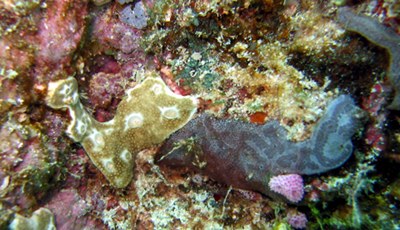The University of Aberdeen Marine Biodiscovery Centre is focusing on research into the development of medicines from unique marine organisms. It is one of only three in Europe dedicated to the exploration of the natural resources from our seas, and one of very few in the world to bring together chemists and biologists to work together on the development of pharmaceuticals.
Funded by the University’s College of Physical Sciences and Development Trust, the centre is part funded by the Biotechnology and Biological Sciences Research Council (BBSRC).
Facilities include a library containing hundreds of pure compounds and thousands of extracts from organisms sourced from across the globe, including the Mariana Trench, the deepest part of the world’s oceans located in the western Pacific Ocean. The library, which has received financial support from the Scottish Universities Life Science Alliance, is available for use in biological research and drug discovery by academia and industry.

Fiji Seasquirt is just one marine species that could be used in medicines research
A magnet that is 250,000 times stronger than the Earth’s magnetic field will be used to interrogate the chemical structure of molecules, and a system that can identify how metals occur in living organisms and in the environment.
Scientists at the centre will carry out research into a number of topics, including the use of bacteria sourced from the deepest oceans to find compounds to treat bacterial infections and parasitic diseases.
Other projects will involve obtaining fungi from Fijian coral reef organisms to produce compounds that may be used to treat cancer and inflammatory diseases and using analytical techniques to learn how mammals fight bacterial infections by starving the bacteria of the essential metals they need to thrive.
Professor Marcel Jaspars, director of the Marine Biodiscovery Centre, said: ‘Scientists at the University of Aberdeen have been conducting research exploring how the rich and diverse range of unique compounds which exist in these organisms can be used in the development of drugs and other novel biomedical products, for a number of years.
‘The creation of the new Marine Biodiscovery Centre is allowing us to advance our research using state-of-the-art technologies, and work towards important new breakthroughs in this crucial area of medical discovery.’
